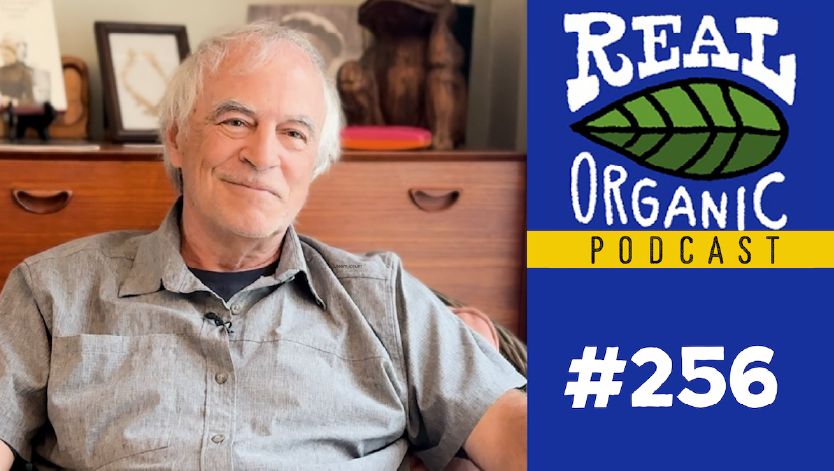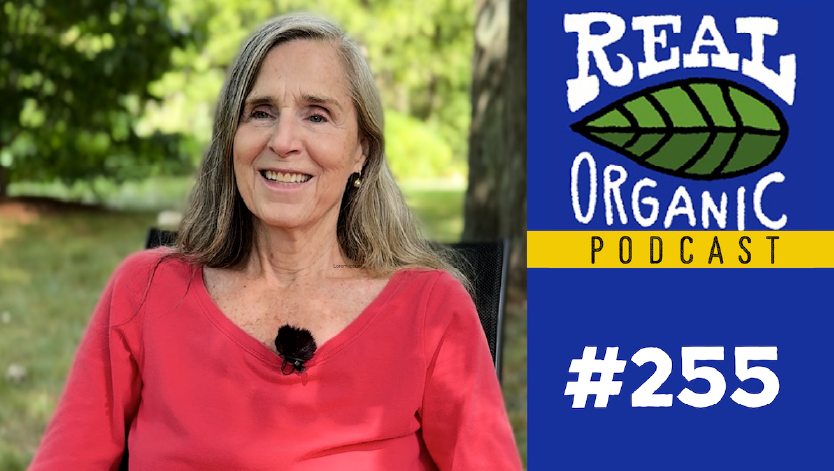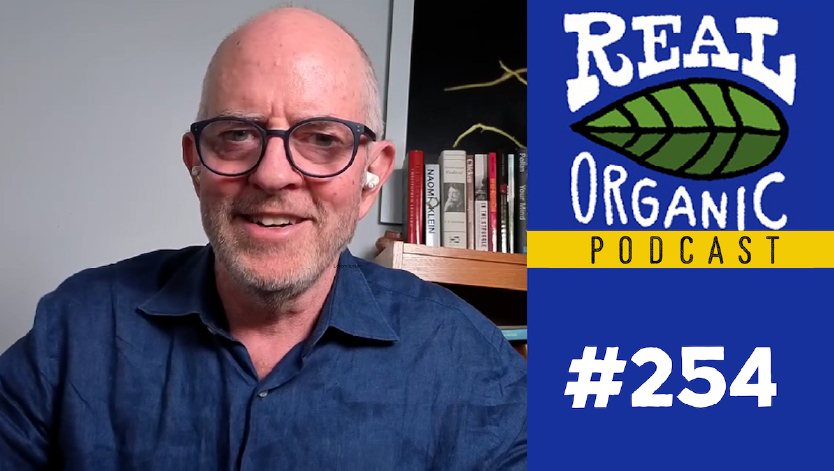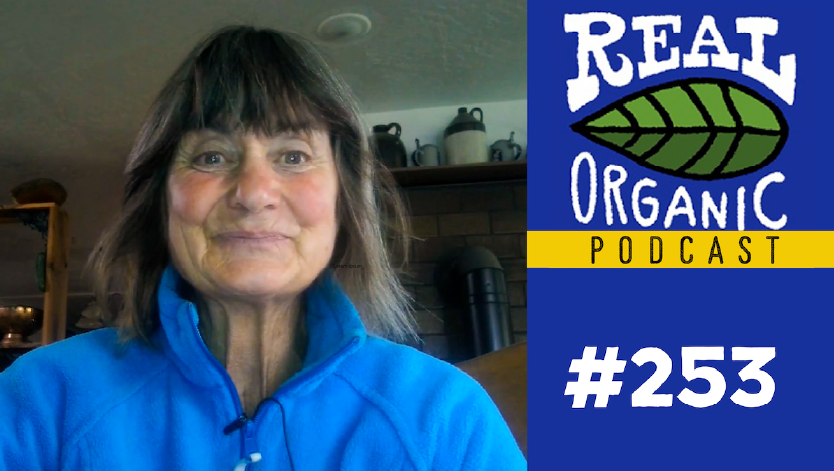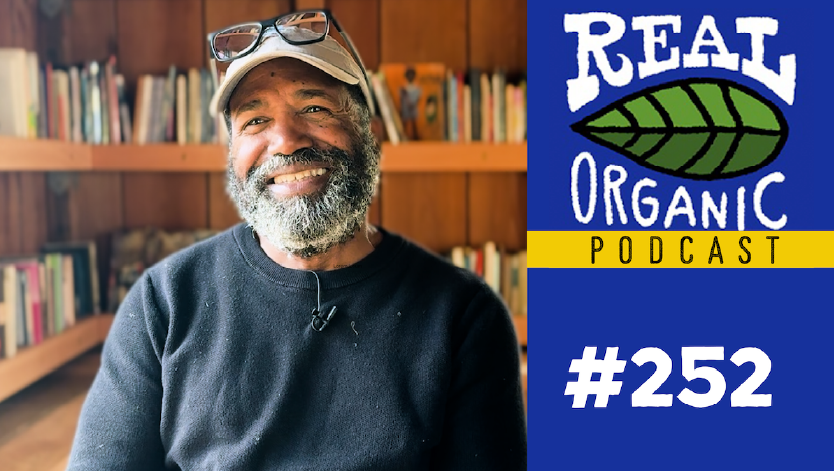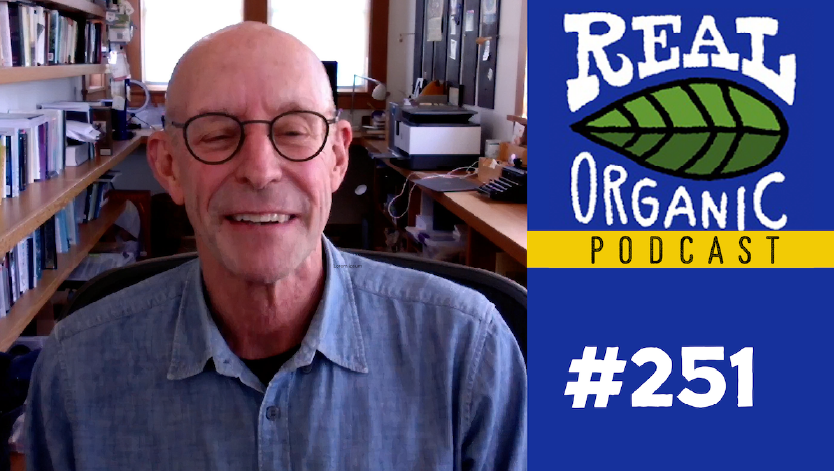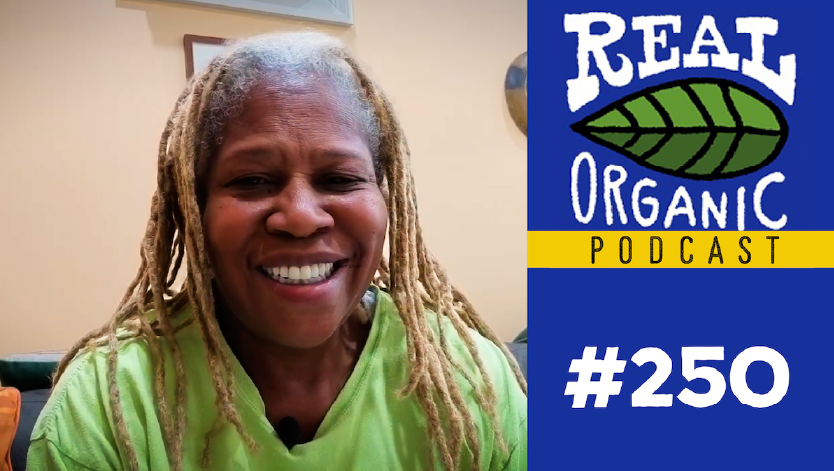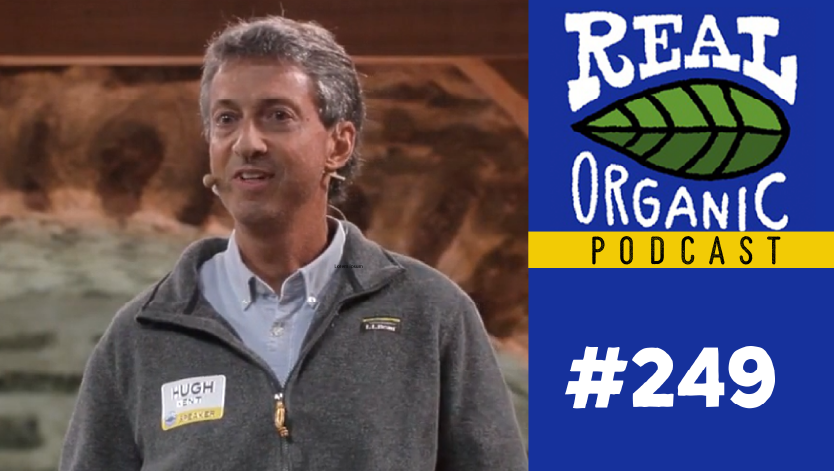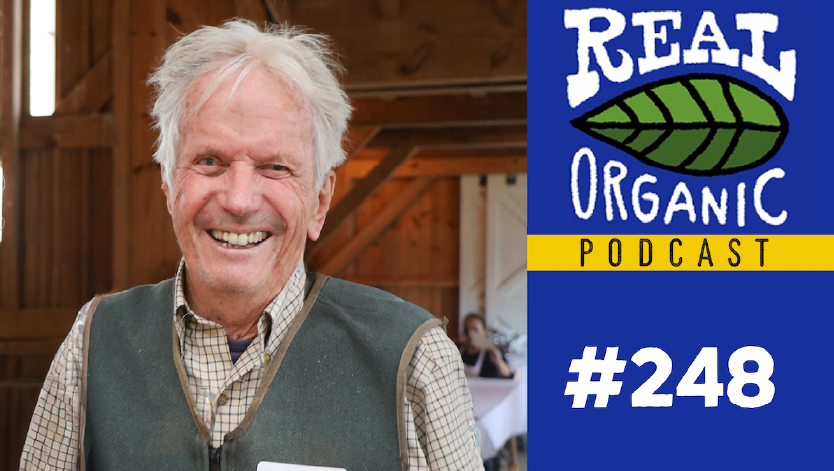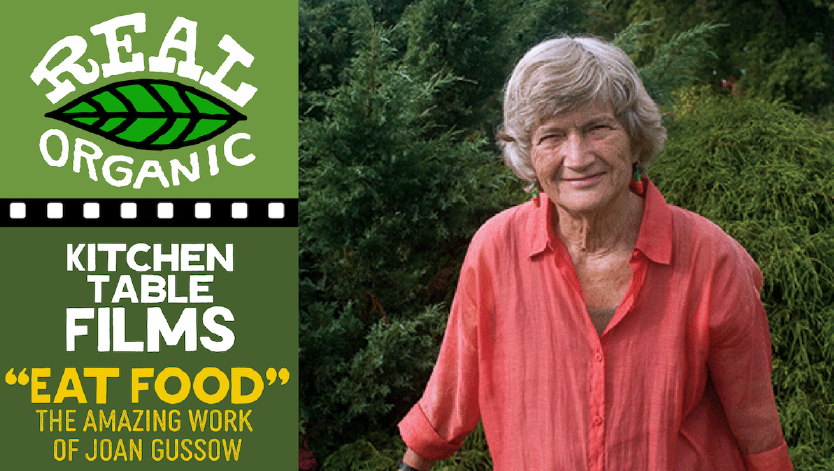Episode #189
Daniel O’Connell: Industrial Ag’s Rapid Degradation of California
Welcome! You can subscribe and download episodes of our show through your favorite podcast app.
You can also subscribe to receive the video version of each episode on our YouTube channel.
Our Daniel O’Connell interview has been edited and condensed for clarity.
Dave Chapman interviews Daniel O’Connell in California, January 2024:
Dave Chapman 0:00
Hey, welcome to the Real Organic Podcast. I am talking today to Daniel O’Connell. Daniel, I’ve been planning on this interview for a couple years now, since a friend, actually Kat Taylor guided me to the book that you co-authored called In The Struggle. And I’m going let you describe your work a little bit. So you come from an academic background?
Daniel O’Connell 0:28
Yes. And an Activist background.
Dave Chapman 0:30
And, and an activist background, I know that you’re very much an activist now. So could you talk about how you came to be an activist academic?
Daniel O’Connell 0:41
You know, you’d have to go back in time to when I politicized in the 1980s, and, you know, politicizing around US involvement in Central America, peace, movement, and environmental. So I moved to Santa Cruz after working for Greenpeace in San Diego, to move in and do tree suits and, and participate in Earth First Direct Actions. But eventually I went to Peace Corps, after being in Santa Cruz for a number of years, came back, did a graduate degree at the University of California, San Diego, and Davis. And in those years, still doing direct action. Everything I could do to facilitate change. And especially around the Gulf Wars, Those mass actions, hundreds of 1000s of people on Market Street and around the globe weren’t making impact. It was during the time at Davis that I was trained as an ethnographer, a critical an ethnographer, I was taught the method of an anthropologist, working in a farm worker town doing community development.
Daniel O’Connell 1:49
I realized that you can put knowledge to work and struggles. And what does that mean? Most people know that through journalism, and what does it mean to be an activist scholar? It was through Isao Fujimoto at Davis that I really began to realize what it meant to both produce knowledge, that would be effectively helpful to communities, you need to, you know, they’re going to train you, theoretically, and you’re going to have to unlearn everything after that to participate in the work on the ground. Okay, I’ll do that. Because theory equates to strategy. And if you’re going to put method or tactics to work, I don’t want to waste my time. And so theory and strategy are effectively going to guide us, so we don’t make mistakes, critical mistakes, strategic errors, or just waste our time.
Daniel O’Connell 2:41
At the end of my time, at UC Davis I had gotten a degree in International ag development, but mostly it was doing work with Cooperative Extension and a farm worker town, Knights Landing about 20 miles north of Davis. In that research, I documented how social segregation was happening systemically and and institutionally what were the barriers, discursive barriers, and also discursive, how power is operating in language and culture? And also sharing some institutional barriers, particularly to Latino farmworkers? So, at the end of my time at Davis, a famous very, very famous book As You Sow, The Arvind Dinuba Study was handed to me, my time, getting masters you’re there for two years, my time was coming to an end. I read the book. It’s pretty dry book, by the way. But it does its work right. Comparing a town surrounded by large scale agribusiness, where DiGiorgio farms historically was down in Kern County, that’s Arvin, California, to Dinuba, in Tulare County, historically, surrounded by smaller scale farms. This research was done by the Bureau of Ag Economics for a Federal Bureau of Reclamation to determine whether federal law should be implemented. The study clearly definitively proves that the economics and the social life, the civic life of this farm of the town that surrounded by small farms is better in in real ways. The retail sales in the town surrounded by small farms is twice that of the one surrounded by agribusiness, and on and on how many schools how many doctors? How many sidewalks? You can measure this. On and on.
Dave Chapman 4:46
Dinuba was the town with small farms? So Dinuba was the town that everybody would like to live in.
Daniel O’Connell 4:52
Yes
Daniel O’Connell 4:53
It was a better town.
Dave Chapman 4:54
A better place to live.
Daniel O’Connell 4:55
As far as you know, if you’re gonna have a family as an incorporated town, not unincorporated.
Dave Chapman 5:00
Right, better schools, better place to live.
Daniel O’Connell 5:03
That’s already pretty significant. And the Goldschmidt’s study was taken up in different periods in our history, especially in the 1970s, the Midwest that that book was passed around like candy.
Dave Chapman 5:04
So Goldschmidt was the author of As You Sow?
Daniel O’Connell 5:17
Goldschmidt, yes, the author, but don’t be too mistaken. Paul Taylor actually probably geared that study. And Paul Taylor had recommended that Mendota on the west side of the valley should be used instead of Arvin. Marion Claussen and Walter Goldschmidt decided not to use Mendota or Fireball, a town on the west side of the valley, they thought that the results would be so extreme that they wouldn’t be believable.
Dave Chapman 5:44
Right. Right. Just before we go on, so I think this is so important. I actually, since reading your book, I’ve quoted this study many times. And the significance of this or the suggestion of this, and it’s one study, but the suggestion is that the kind of agriculture that we have, has a dramatic impact on the communities in which it is happening. So we know that farming has a big impact on the quality of the food that we eat may be far away. But this is talking about what’s the impact on the local area where the farm is happening. Is that right?
Daniel O’Connell 6:23
It’s so critically important. You let’s ask it as a question, what is the democratic scale of an economy? Are there moral ramifications to how our economy is guided? The struggle clearly shows you that that there is a requisite condition and a measurable outcome to these questions. If you do not have an equitable economy, your democracy starts to crater, you lose the civic vitality, those entrepreneurs are also running for government, they’re serving on PTAs. If you have a labor force of completely undocumented immigrants, who many times Spanish isn’t their first language, Mazatec, or native languages from Mexico. They can’t vote. We have in the San Joaquin Valley, continuing to this day, literal racialized oppression occurring just four hours from San Francisco, the most progressive place in the United States, right? And it’s tolerated. It’s a moral and ethical engagement. But I will also say that if we don’t engage, this atrophy starts eating at our society, like a cancer. People lose their narrative, start taking up everything from blaming immigrants to weird, religious ideas. We need to have people in the society that are stable enough to defend the democracy, when these private interests are, are weighing on it. And so it’s a it’s a requisite condition for a democracy, but it’s also measurable outcome. So the book, we can kind of skip ahead, but we need to go back to As You Sow in a moment. You can measure this scientifically. And a case study between two towns is not the best methodological approach to answering the question. Regression statistics, that which ag economists use is the one that comes later. But I wanted to just mention just that narrative of As You Sow, which is also the biblical for warning for what we’re living in now….The book is given to me. It’s shocking. Right off the bat, proves its case pretty well thoroughly. And then you realize that the book, that was paid for by the federal government, by the Bureau of Reclamation in order to determine whether a federal law the 1902 Reclamation Law should be implemented, was immediately upon its release censored. And a follow-up study that was going to use statistical analysis was suppressed. The federal government paid for research to be done and then suppressed it immediately when it came out. What does that mean for the values that are animating our society and our democracy? When scientific knowledge can’t be put out there to guide public policy. This public policy by the way wasn’t cursory. The reclamation law passed by Theodore Roosevelt in 1902, and a very progressive of Congress. It stipulated, and we recognized this country that we were going to build, build and develop infrastructure in the West, the rainfall doesn’t fall differently in two sides of our country. So they were going to dam the rivers. This bargain, this deal that they were going to do with our society was not supposed to benefit large landowners or speculators. So the law was very simple. If you willingly sign up to receive subsidized federal water, there’s some conditions, you have to be a farm of 160 acres or less, which was the historic measure of a small family farm in our country going back to the Homestead Act. You had to live on the farm. That’s it. Really reclamation was about building society and building homes and building community. The catch is the Western United States, and especially California’s Central Valley, and San Joaquin Valley, were already unequal. The history of California comes from Spanish land grants, and there was a history of, of both economic recession and, and crises and panics if you will, and also droughts that were always pressuring the smaller scale farms. So there’s already consolidation happening. Sure enough.
Dave Chapman 11:26
When hard times would come, small farmers would be forced to abandon their farm to be bought up by a bigger farm.
Daniel O’Connell 11:33
At a discount, right? You’re highly stressed, and it comes down to can I feed my kids? Or you sell the farm to feed your kids. And so these crises that hit smaller scale farmers, harder than the large scale ones that are better capitalized. Sometimes you just think the capital just waits for these moments of crisis, and it comes in. So what are reclamation values? I’ve mentioned two. The 160 acre limit, which is the historic standard of what a small farm is in our country, you also had to be a resident of the farm. But there was one other piece, that’s really important when you consider the San Joaquin Valley and the inequality in equal land distribution that was already happening in California. If you were a landowner and you signed the contract receive federally subsidized water, after 10 years, you will be obligated to sell all land in excess of 160 acres at its pre-water prices. So there was going to be no speculation on your land as well. Everyone signed this. What does it mean? This is a voluntary land reform, right? Voluntary land reform and don’t think that land reform is anathema to the United States. We instituted land reform after the Second World War in Japan. Personally, I know that 10 families in El Salvador own 90% of the arable land and, and we’re guiding the arena party, which is a reactionary force, it was killing peasants. Unequal land ownership equates to feudalism, equates to the erosion of democratic values in life. You must have an economic equity is contingent upon a democracy. And so the game is on now, right? They know they’re bringing the water, this the federal government.
Dave Chapman 13:31
Let’s talk about the water. Now, the Central Valley at that point, didn’t have the kind of access to irrigation that it has now. Is that right?
Daniel O’Connell 13:42
Well, it’s so ironic because people think that this is a desert, and certainly the west side of the valley and in certain times is an erratic climate. So you want irrigation if you’re going to have farming. There was dryland wheat farming at first, but the place is not a desert. During wet years, there’s years that you could take a boat from Bakersfield to San Francisco. Yeah, the largest lake west of the Mississippi was there, Tulare? It’s only 40 feet deep, but it was wide. And I’ve hiked in the Sierras a lot. It was basically enormous meadow John Muir describes the wildflowers of the San Joaquin Valley, artesian wells would explode from the ground, there would be so much water in the San Joaquin Valley, that same place today. Lake Tillery was the place where industrialized agriculture was centered. Not only is there not a lake there anymore, but the ground there, they pump the water out of the ground at such a rate that there’s a land subsidence now, right? A collapse of the entire aquifer, the greed, the extractive nature of this kind of capitalist economy, both extracting labor and resources, Basically a Serengeti kind of scale, wilderness and enormous amounts of water in the same ecosystem. And it created a place that today is yes, the most productive ag region in the history of the world. But for California and for a person from Fresno, or for the San Joaquin Valley, we know that we have the highest levels of hunger, poverty, pollution, both air and water in the United States. So imagine that, that dichotomy there, of where it was, and where and we basically put in the infrastructure, and we allowed political policies to happen. To make this happen, the subsidies go beyond water, but we’ll stay on water if you’d like.
Dave Chapman 15:53
So I just want to understand the structure that we’re talking about that, that I think greatly increased the value of the land to the people who had large tracts, and suddenly, the value went way up. Why did it go way up?
Daniel O’Connell 16:08
Because you go from dryland cattle, or dryland wheat, to walnuts and almonds and cotton. And now today, subdivisions.
Dave Chapman 16:19
Right, but because of the access to irrigation, yes. So what was the access to irrigation mechanism?
Daniel O’Connell 16:27
So the mechanism was the building of the Central Valley Project. So the Central Valley Project is probably one of the world’s greatest engineering feats, bringing water from the north of California to the south. That enabled the land the speculation on the land jumps at that point.
Dave Chapman 16:49
Just as the Tennessee Valley Authority?
Daniel O’Connell 16:54
It’s exactly the same thing.
Dave Chapman 16:56
And they did this with dams and aqueducts. So they gave it so that there was access to a lot of water to a lot of land, which immediately shut up the value of that land.
Daniel O’Connell 17:09
Yes.
Dave Chapman 17:10
Okay.
Daniel O’Connell 17:10
And the process of consolidation starts, ironically, because the law that was stipulated to divide the land into 160 acre limits, parcels – was never enforced. And now you start getting into the politics of this, that began with the study. So you start foreseeing what’s to come as far as the political corruption. So in the struggle, documents, basically legalizing of a crime over time, but the breaking of laws, and the massive, massive corruption, taking public resources for private gain. Basically, if you will, I think Martin Luther King said at first, you know, it’s the classic socialism for the rich capitalism for the poor. But what really gets you as a student, is to then realize this story, that comes out on how much the subsidy happened. The Bureau of Ag Economics was also researching what was happening in the South as it was black sharecroppers were pushed off and land. So the two studies both starting to look at the south critically through a federal bureaucracy, but also, especially the Goldschmidt study that was conducted. Within five years, the entire bureaucracy of the Federal Bureau of Ag Economics was dismantled. Most people don’t know that the Farm Bureau itself was fostered. It was housed at UC Berkeley for the first 30 years of its life. Why not partner with a historic, more progressive institution of the Grange? The system was already gearing up to consolidate. And there might be some benefits to that. Certainly, the productivity rise, but the externalization of costs was never factored in. And the abuse, the moral problems that start coming forward, especially on the labor side of things during World War Two, the other great subsidy….There’s nothing barring you from producing everything, 350 varieties of crops grown in the San Joaquin Valley. You need water, you need labor, right? The soils there, the sunlight is there. Wonderful that we’re not having a lot of rains in the summertime, you know, it’s greatly beneficial to both insects, fungus, and other things.
Dave Chapman 19:37
As long as you have irrigation.
Daniel O’Connell 19:38
Irrigation, then the labor side of it. World War Two, the institution of bringing labor into fighting. A federal program that recruits labor in Mexico and brings it to the United States. There’s another irony here, that 1/3 of Mexico was taken 90% In 1848, against slave territory, so they’re trying to immigrate back into their own country historically. This program after the war ended stays for another 20 years. So the Braceros program goes until about 1963. Basically undercutting all labor. After the Braceros ends, there’s a dramatic increase of growers, encouraging immigration and residency in the San Joaquin Valley. And here’s the piece, the contradiction, that’s kind of nice, that completely changed the demographic constitution of the valley that today is driving a wonderful change. We have many young families, and demographically, all of those folks that came here either as producers, or to work in farm labor. They’re having kids that go to Berkeley and Davis and Santa Barbara, and they come home. And they’re changing the political geography of the valley today. But this abuse of labor that even goes back to Chinese and Japanese, that we’re working here under alien land laws that were extreme. If people think California is a progressive state, they don’t realize the founding of the state. That it is an extraordinarily racist place that genocide was codified in, in the payment of, of making payments for body parts of native peoples, that was part of a government policy here. And then the labor history of inviting immigrants to be taken advantage of. I think we got a hold on that now. But we’ll see. I think the tide is turning now.
Dave Chapman 21:40
Okay. I think that you said that, basically, the intensive vegetable production in the Central Valley was almost transplanting the plantation culture of the South, pre-war plantation culture to the west. Did I get that wrong?
Daniel O’Connell 21:59
You know, my friend Mark, Arax seems to be better and calling it out. But absolutely, because they started growing cotton for a period of time. So literally, folks from the King of California will show this, there is historic African American towns in the in the valley. African Americans were brought in as labor, as a piece of the labor force during those years.
Dave Chapman 22:25
But I wasn’t even thinking just about the issue of enslavement. I was thinking about the issue of large, large tracts of land being farmed by many, many hands in a very labor intensive enterprise. With all of that profit being consolidated in very few hands.
Daniel O’Connell 22:43
It’s a exact, it’s a appropriate metaphor. Yeah. I sometimes toyed with the idea of calling it feudalism, because you have a political dynamic with not having people able to vote.
Dave Chapman 22:56
Yeah, that seems like the critical piece there. And you looked at those two towns in California, and one had a lot of people there who actually had no way to vote, to affect the local government.
Daniel O’Connell 23:08
In the studies done in the 1940s. Arvin had a lot of Okies and Archies still there from that came out in the 1930s. The labor force in those years was mixed between poor whites, African Americans, Filipinos, and Mexican Mexican American, it was very diverse. And you saw in the book, Ernesto Galarza, starting to organize across racial and linguistic lines, which you must do. And the Wobblies did it before that in 1910, 1911 in the region as well. So a necessity today, the labor force is predominantly Spanish speaking, I would say, and also coming from Mexico, including a lot of indigenous folks from Mexico. Okay, so the metaphor of the association in our culture with plantations. As I mentioned before, I tried to describe this as there is active, racialized oppression happening in California at this moment, without a question that’s happening. Yeah, we’re tolerating that. We’re looking aside, especially white folks. We’re just choosing not to look, you would drive down the 5 and the 99, and you see what’s going on. I think everyone knows an inkling of it. We’re tolerating this and it’s intolerable, that now we’ll change.
Dave Chapman 24:30
Yeah, I think that for most people in most of the country, they’re truly unaware. They have never been to California. They’ve never seen the Central Valley. They have some glimmer that there’s a lot of people working in the fields don’t make much money, but they don’t really know. And of course, now a lot of that agriculture is shifting to Mexico, where they’re paid much, much less. Conditions are much worse. And it’s truly out of sight, out of mind now that it’s not even happening in the US.
Daniel O’Connell 25:04
I don’t want to let them off the hook too easily. They’re aware. Okay. Even in there in Iowa, they know who’s working in the abattoirs and the meatpacking plants. Yeah, everyone knows. And in fact, ironically, maybe because there’s a kind of social psychology here, you often blame the folks that you’re oppressing….I live in the inner city of Fresno, and my next door neighbor, he drives a forklift. He’s Latino, we’re friends. He comes over and says, “What’s this?” I say “it’s my book, just published.” I give him a copy. He might have a high school degree, but I think it’s mostly in story. You can read this. So his wife sat behind me, she asked, “What’s the book about?” I sit back and think I have to make it digestible. So I asked her a question, “Why are poor people poor?” Her answer, she thinks drugs. I look at her, I say I think drugs are a symptom of the problem. The cause. And I say to her, “this book shows you why poor people are poor. And that is not their fault.” The struggle delineates a typography, of systemic and institutional mechanisms that are weighing in, especially on farmers that are driven off the land. Often NAFTA, Mexico or the Dust Bowl in America, extremely desperate people arriving in California during these times. It maps out this critical topography…It teaches you both the values that we should be defending through the voice of scholars, particularly that we’re engaged in the fight. But it also starts to show you how to fight back. We haven’t won that fight yet, we’re actively in California engaged in it, we are taking ground, we’re gonna win here. By the time we win, it’ll be a devastated ecology and society, that will rebuild. But they will suck every drop of water out of the ground. And the folks that are left will have traumas that are embedded in their bodies, the cancers and the devastating effects of their labor, and their abuse. But we’ll start healing and building and growing with the book. Basically, going back to my neighbor, it’s a book that’s meant to be able to let you know not only that it’s not your fault. But here’s the way we can work together to to ameliorate it and to transform the society of the moment that we’re facing ecological, you know, climate change is coming. And this, this bifurcated split economy is still a problem. It lays out a path what happened in California, lays out a path for addressing places like potentially what’s going on in the Midwest or in Brazil or India. I hope.
Dave Chapman 25:27
All right, well, we’ll jump to Iowa. Let me just think about this. You’re proposing that the very same internal logic, I don’t know if that’s the right way to put it. But let’s just say the worldview that creates brushing aside the laws, building an enormous amount of profit off of, of using our tax money for personal gain. That the same mindset also creates basically relationships with people who are working in the fields that are that are predatory. I’m trying to find the connections here, that this is all connected, that the environmental degradation and the human abuse. We’ll get to Iowa we’ll talk about animal abuse, that these are all coming out of a certain twisted logic.
Daniel O’Connell 29:52
I’ve spoken sometimes at UC Davis. Sometimes those are agronomists and natural scientists They were so narrowly focused on their problem. They didn’t look at the other costs. I truly believe that some of them think we we did it. I don’t know how much it’s worth the blame here. I would love to see institutions, like land grant universities truly start turning and pivoting towards better partnership with active communities directly, which we’ve done in the past. Cooperative Extension once did rural operas and during the Depression, right? So we can, we can turn our institute, our public institutions predominantly to just start helping, and especially because the struggle shows that in the past, they were complicit in creating a problem. The land grant schools were supposed to be for the workers and the small farmers and in the end, to a significant extent they broke that contract, we need to re-engage that contract with community, with our specially with our public institutions, like universities, the government itself. It needs to do better at this time. To begin mobilizing community to actively process problem solving in effective ways. If we don’t have those, though, civil society itself needs to start mobilizing on its own. Regardless of whether it’s institutions and agencies that should be helping us or helping or not. That’s probably where we’re at now, just as Don Villarejo said, “take a bath among the people.”
Dave Chapman 31:53
All right, I want to come back to solutions or next steps. You said that you’d like to talk about the Midwest a bit. So let’s go there.
Daniel O’Connell 32:04
I’m curious about it. Paul Taylor is from the Midwest. You see, with Dorothea Lange, their fight against latifolia. For agrarian democracy, the values of in the struggle are Midwestern values. Landscape. Yes, it was settled, it was colonized in the horrific violence. It was settled with smaller scale farmers. North Dakota was electing socialists in the past. Minnesota, Wisconsin had senators that were just a foyete. I mean, Nelson, massively huge personalities. The progressive movement was centered in the Midwest. This book harkens back to that because of Paul, when Paul moved from the Midwest to California. He witnesses this disjuncture, and it literally confronted him and he started both the first some of the first academic studies on Mexican labor. He also was very engaged in what was him and Dorthea and what was happening in the south, the sharecroppers.
Daniel O’Connell 33:36
I feel like things are going well here now. And we still have 10 to 15, 20 years, but it’s going well. After the book came out, we were invited by a few academics at the University of Minnesota, and some historic food movement, activist and organic farmers in the Midwest in Minnesota, Kern Fern Holtz, among them and western Minnesota. To tell the story of the Minnesota Institute for Sustainable Agriculture. So Scott Peters and I, following the publication of In the Struggle, accepted an endowed chair position there. People like Sister Mary touched me, who the Catholic Church charged with organizing the entire Midwest, along with others. Because the parishes were suffering when the the dislocations of the 1980s farm crisis were happening, and they were just losing people. So the Catholic Church of all entities started mobilizing to defend its parishes. And through that the farms. So it’s a wonderful, wonderful story. And the University of Minnesota, to its credit, initiated the Minnesota Institute for Sustainable Agriculture similar to the Leopold Center, which she was later attacked and kind of undermined in some pretty dramatic ways in Iowa. And sometimes we wait for periods. And this is why it’s important to publish things, these academic studies and coalesce them and stories in a book like In the Struggle to carry them forward to be used again. When the civil society is ready for that moment that magically starts fomenting into a social movement. I have to say I was interested to see, just drive through rural, Midwest, upper midwest, it’s not as devastated as California, which was, which filled my which I was happy for this coupling of corn and soy, and the consolidation that’s happening in the Midwest. There’s other consolidations, pigs. It’s the same threat. But now it’s coming home to where Paul Taylor was, he went to the University of Wisconsin, he’s from Iowa. I worry….Kansas and all of these places, were some of the most progressive and when I use the word progressive policies in the public interest, simply put that policy is in the public interest, broad public. Are we losing our narrative, our stories as a society as a country, when the bastions of where those values were once so fervently defended? Start decoupling? So there’s a lot I’m curious about that my work is here. I’m from California. But I do think that the lessons of in the struggle and what happened in California might apply to other geographies.
Dave Chapman 37:01
Why do you think that this area in the Midwest that was once so progressive, meaning?
Daniel O’Connell 37:08
Consolidation.
Dave Chapman 37:09
Okay.
Daniel O’Connell 37:11
It, again, going back…you witness how civil society functions or healthy civil society and how it is inexorably linked to economics. Paul Taylor once said, the academic disciplines of political science and economics should have never been decoupled. Politics and economics go like this. And it’s interesting during the McCarthy years, political economy was probably a euphemism to get to any semblance of critical engagement or or, you know, Marxist, kind of theorizing. They should never be decoupled. And and we see in the corruption that’s happening in our society, that these major private interests will have no scruples. They will literally blame welfare mothers, immigrants, African Americans, for taking too much when they themselves are grabbing enormous portions of our public. They are being subsidized. We are subsidizing them and they get so used to being on that teat. They just keep on sucking and sucking and sucking until there’s nothing there. Paul Taylor, only at the end of his life did we lose the reclamation fight in about 1982. He once warned, forwarned us to be very wary of a monopoly of land that then is supported by a monopoly of water because of how water rights are adjudicated or portioned. In California. Those are married. And after we lost reclamation, the reclamation fight, those two massive monopolies now sit on top of each other with entities that are extremely powerful. Bernhardt worked for the Westlands Water District and went in was he the Secretary of the Interior, where he negotiated these kinds of future further giveaways, massive giveaways of water. We need to shine a light on the corruption and then educate each other and start organizing to change it. They’re not impenetrable, they’re formidable. But once you get inside of them and start just asking questions and looking these little and pushing, you can break up in little fissures and over time those widen those the interstitial work at first of confronting you enormously powerful structures. We can’t let that stop us from engaging. And I do think that folks with a PhD, or folks that that have some privilege should be at the forefront of that sometimes, especially when the violence is going to happen. But also to make this inquiry to shine the light back onto the system. When I did that ethnography on Knights Landing as a graduate student, I read Laura Nader’s suggestion to anthropologists to study up into the power structure to delineate it. So this is a unique role, I think the scholars can play that you see in the book, this succession of handing the baton forward. And some of these people aren’t PhDs, half the people in our book are not, they don’t have a PhD. You don’t. Gramsci, Antonio Gramsci shows us that we don’t, you don’t, need to have a pedigree, to be a scholar, and especially to be a critical scholar and solidarity with working folks, family farms, and farmers.
Dave Chapman 41:11
Okay, that’s great. I want to I want to go to solutions. But before we leave Iowa and Minnesota, is there anything else you want to say about the problem? You say the promise consolidation? I think it’s a little bit of a mystery. To most people, it certainly is to me why we’re in a period of such intensive consolidation. I see it in every aspect of the food system. I see it in the farms. I see it in the distribution. I see it in the retail. I see it in the governmental controls and regulations, they’re so heavily controlled by these very large and formidable economic interests. I’m not sure that I understand why this is happening at such a rapid race pace right now. Do you have any thoughts about that? I mean, I don’t know if you have that same impression that I do?
Daniel O’Connell 42:11
I do. I don’t think we have as firm a hand on the mechanisms of government. I think they care a little bit more about their campaign contributions, than us. And Citizens United and things like that don’t help other animals. Other scholars look more broadly, the consolidation is happening across the value food chain. I think maybe it’s because of my Irish disposition that the land after 800 years of having folks take it from us and having us starve. So when I go out, driving mostly to Western Minnesota these days, I’m curious in an academic sense of who owns the land. I asked that question once to a scientist in Minnesota, and said most of these are people that live in Twin Cities are leasing land now. Okay, maybe. And I think we just need to start asking. We have proven that this consolidation is is dramatically, astronomically negative to our society, we’ll lose our democracy if we don’t. If we don’t address it. Literally, we’ll lose our democracy. And we’re in the process of losing our democracy, currently. We had the first attack on a democratic transition of power a few years ago. And, for instance, Donald Trump is still polling in 30% of the folks, right? I don’t know, a lot of folks. I think that if you really want to get to problem solving in this arena, you need to go to the foundations and the structures, and that’s addressing. So labor unions, I’m for more equitable mechanisms that I think we can envision cooperatives. Labor unions were strong in the country, and labor unions were one of the most formidable mechanisms for us to confront these consolidations of power. In the 1950s, 40s, we had an enormously large middle class and there was a large labor movement at the time. There’s other mechanisms that we have. Now at our hands, that can be potentially upscaled. community land trusts, ways to take land out of speculative ownership, but hybridize it so you have a vested ownership of a certain portion of it, the house and the use of the land for a long lease. These are currently mechanisms that are used to achieve affordable housing that can be applied to rural areas. And the first community land trust was an African American farmer, I believe in the south. Taking the lessons that were coming from Israel with Moshav and kibbutz, and after Gandhi and struggle in India, many of these folks that went over to live on those communes in Israel or participate in revolution in India came home to the UK and the United States and, and one of the outgrowths of that was Community Land Trust’s. So there is mechanisms that promise equity better than we have. And we need to start invigorating those structures better, applying them to more geographies. But I still also think there’s just a massive education project before us. Redo the Goldschmidt study. The Goldschmidt study, by the way, was the retest was censored. Dean McConnell did it using regression statistical analysis 30 years later at the University of California, and did it to get not only to the west side of the San Joaquin Valley, not only to the entire San Joaquin Valley, but to the entire Sunbelt. And as he’s publishing the 1980’s Midwestern Farm Crisis occurs, which I think is the initiation of another consolidation in the Midwest, right? Is a lot of folks lost their farms. So we need to continue to ask, who is grabbing this land? Who owns the land? It is going to be obfuscated and very difficult to find. I don’t think it’s as easy, I think they were hidden in LLCs, Limited Liability Corporations and other mechanisms. But we can find who owns the land. And therefore if you own the land, it’s the basis of owning the economy, right?
Daniel O’Connell 46:44
We have to. There’s no option not to engage in this fight.
Dave Chapman 46:48
There’ll be no innocent bystanders. One way or the other, you’re in it.
Daniel O’Connell 46:56
You are, you’re going to be victimized by it. The first folks that are victimized are the rural folks, farmers, the folks trying to make a living in rural, rural America. We need to pay more attention there. As the climate crisis comes fully on to us, moving north is going to make some sense. Some people I know went to Cornell, so a place like Buffalo might become a climate refuge, right? A lot of these towns are struggling, the kids aren’t coming home, they’re leaving. I live in an area where there’s massive amounts of young people, the San Joaquin Valley, it’s the rich and we have Hmong, Ms. Tech is, just the most diverse place you can imagine and young and vibrant. It just fills my heart. And I hope that we can have the same hospitality and welcoming that we’re trying to do here now in the San Joaquin Valley of defending the vulnerable, in these other geographies that can be refugees, and probably will be refugees in the future. And it’s for the benefit of the society to have a place where you’re not losing your youth, but your youth are coming. You know, there’s young families, but the key to this is a diversified economy. Just like in ecological systems, mono crops, the potato famine, they were farming for varieties of potato and a fungus hit, everyone starved. The British were still exporting food, by the way, at the time, it’s the nature of capitalism. Just as unbalanced as a mono crop agricultural system is. And we’re here at Full Belly Farm, where I walk around and I see everything from native grasses to every sort of planting here, every kind of crop. That’s a resilient system. The same holds true for our social systems. Diversity might be the solution to both ecological economic and holds true in any economy. You want to diversify the economy. It’s resilient. What happened during the pandemic when COVID hit meatpacking plants and we realize that our supply chains are extremely vulnerable because they’re so consolidated? This consolidation bridges from politics, to ecology to agricultural systems. The answer is really simple. Equity and Diversity throughout both systems.
Dave Chapman 49:52
Okay. Okay, so we all agree we want a functional democracy. I think we all agree we want mutual respect amongst citizens. We all agree we want people to have a decent life. The question that everybody asks is, “what can I do?” And everyone has to find their own answer. But what’s your answer? When somebody says, “what can I do first?” I see what you do, you spend a great deal of your life energy on educating and organizing and, and trying to create change. But let’s say that I’m not there. What can I do? What can what can somebody do? Who wants to do wants to change this for the better? What What are your thoughts?
Daniel O’Connell 50:51
First thought is I’ll just go back to Joe Hill and say, “Don’t mourn, organize.” And by the way, there’s going to be a lot of mourning coming for our grandkids, what they’re going to be living in, we’re here now. What I’m going to suggest isn’t going to be for everyone.
Daniel O’Connell 51:11
Move into the core of the worst problems that are nearby in your society, and problem solve. And sometimes that’s going to mean not saying much. Just being present. I come from a background where my folks were really, really poor growing up, but I was okay. In a certain moment, I knew I was going to contribute. In the book, when I talked to many young people, almost all of them folks of color. And I recommend some chapters over us, Ernesto Galarza. And there’s a portion in Galarza’s this chapter where he’s talking to Chicano Studies students at Berkeley in the 1970s. You imagine a more rebellious group? They start asking him these questions, it’s in the book. And he forewarns them. And he’s telling them that they’re really unique, in where they are in a graduate program at UC Berkeley. And they’re ready to hatch, and go out in the world. Liberty Hyde Bailey said similar things to undergrads at Cornell 100 years ago. Get engaged, get engaged, directly. We need to pull our institutions. We have a marvelous land grant university system because it’s connected to the Cooperative Extension System, both can function better. In the book, you see, Isa Fujimoto was another chapter, I then tell these young people to read. Isa Fujimoto in the middle of the 1960s is bringing young people, he’s encouraging them to spend internships in the Mississippi Delta, and Appalachia, in the San Joaquin Valley. And these students are coming back. They’re going out raw, there’s no internship program or insurance. They come back, and they write pamphlets for the future students on how to live out of a car, how to get free food. In addition to understanding how theory can be used in the politics of actually doing research, which can be highly extractive as well, we’ve learned a lot of lessons there, how to do ethical research, those students were teaching each other as well. Isa then would use those to teach his future students. But he was sending out the students, these idealistic young folks into the most dangerous contexts of our society, places where they were going to face literally, political violence at times. And of course, you know, two Cornell students were killed in Mississippi registering voters. The moment is going to come when the next generation will simply mobilize. We need to be there to help them, we ask ourselves the question, what your age is, it can also get involved along these lines of race and class, gender we need to be very conscious of especially white guys have the history that we embody and represent the folks often we’re not going to be the leaders of this. I constantly look to empower others, when we should step forward is when the threats of the most extreme, otherwise step back. You’ll be humble. But you learn these things by being in the room and people trust you, they can read you well, especially folks, the subaltern, the oppressed, they’ll read you in a moment, they’ll see you coming. So let your goodness and your love guide away. I’m a scholar, but I’m also a Quaker. So it takes a lot of things off the plate. I’m actively nonviolent, and we as friends, Society of Friends, Quakers always appeal to the goodness of people and we see that of God in each person. So that will keep you from using violence to get that against that person. But it also is a way of inviting even the people that you think are embodiment of the problem, a racist or agribusiness owner. There are folks that as willing and open as anyone at a certain moment. We just need to keep inviting them. And finally, I’ll say because you’re going to witness, if you’re coming from a secure spot, you’re going to witness the oppression. And you’re going to witness suffering. And there’s going to be nothing you can do about it in the short term. Without it overwhelming you. So you’re going to have to keep your center, keep your balance, keep your health and well being your own. You’re not going to help anyone if you’re not taking care of yourself. I meditate all the time now. All the time trying to stay grounded, keeping balanced. There’s boomerangs. There’s there’s ricochets happening in the movement all the time. Folks that you help turn around, and go for it, you know, you need to be practice a lot of humility and love and not take things personal and take the long view and be willing to suffer for your beliefs, maybe. So it’s not going to be for everyone. I don’t know what to say for the regular folks, just politicize what your consumption may be. Just politicize what you consume both on your iPhone and at the grocery store. That’s the easiest thing you can do is follow track that back to where its origin was. Is that ethical, how it came to you? That’s a simple thing to do. Align your your life with your values and interrogate your values to make sure they’re sound. Alright.
Dave Chapman 57:40
Daniel O’Connell, thank you very much. It’s been great to talk with you.
Daniel O’Connell 57:43
Likewise.


